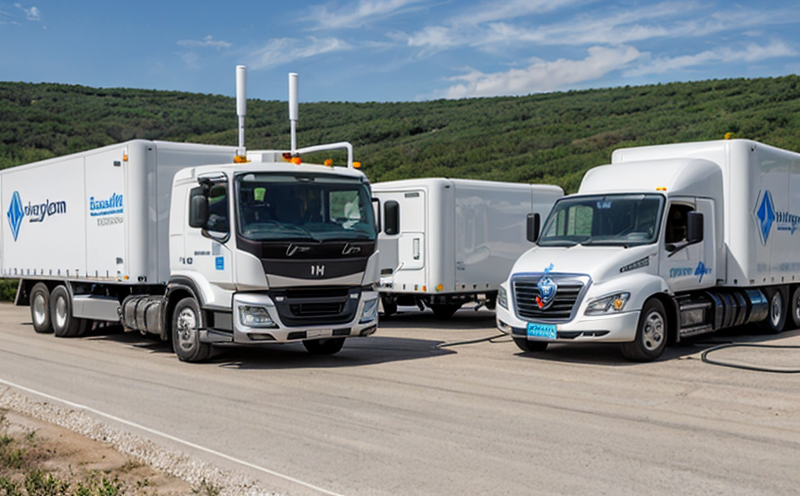SAE J2578 Vehicle Hydrogen Component Safety Testing
The SAE J2578 standard is a critical component in ensuring the safety and reliability of hydrogen fuel components used in vehicles. This service focuses on providing comprehensive testing according to this standard, which is essential for manufacturers looking to meet stringent safety requirements before commercializing their products.
SAE J2578 addresses the testing methods necessary to evaluate the integrity and performance of components that are integral to vehicle hydrogen fuel systems. These components include but are not limited to hydrogen storage tanks, valves, regulators, and related assemblies. The standard is designed to ensure these components can withstand the rigorous operational conditions typical in vehicular environments.
The process begins with thorough component preparation. Hydrogen components undergo a series of tests aimed at identifying potential weaknesses that could compromise system safety or performance. Key tests include pressure testing, leak detection, and thermal cycling simulations. These tests are conducted using specialized equipment tailored to the precise requirements outlined by SAE J2578.
One of the primary challenges in hydrogen fuel component testing lies in replicating real-world conditions as closely as possible within a controlled laboratory environment. This involves not only understanding the chemical and physical properties of hydrogen but also accounting for environmental factors such as temperature, humidity, and altitude changes that can affect the performance of these components.
The standard also emphasizes the importance of safety protocols during testing, ensuring that all personnel involved are trained in handling high-pressure systems safely. Compliance with SAE J2578 ensures not only regulatory adherence but also enhances brand reputation by demonstrating a commitment to excellence and innovation.
| Test Parameter | Description |
|---|---|
| Pressure Testing | Determines the maximum operating pressure of hydrogen storage tanks and related components. |
| Leak Detection | Identifies any potential leaks in the fuel system, ensuring tight seals and preventing gas escape. |
| Thermal Cycling Simulations | Assesses how different temperatures affect component performance over time. |
| Cold Flow Testing | Evaluates flow rates at low temperatures to ensure the system functions correctly in cold climates. |
The use of advanced instrumentation is crucial for accurate and reliable testing. Our laboratory employs state-of-the-art equipment capable of measuring minute changes in pressure, temperature, and flow rate with precision. This ensures that even minor deviations from expected performance are captured, providing valuable insights into component behavior under various conditions.
In summary, SAE J2578 Vehicle Hydrogen Component Safety Testing is essential for ensuring the safety and reliability of hydrogen fuel components used in vehicles. By adhering to this standard, manufacturers can demonstrate their commitment to quality and compliance, ultimately leading to safer and more efficient vehicles on the market.
Industry Applications
- Vehicular Hydrogen Storage Systems
- Hydrogen Fuel Cell Vehicles (FCVs)
- Hydrogen Refueling Stations
- Vehicle Safety and Reliability Assurance
The SAE J2578 standard finds broad application across the automotive industry, particularly in sectors focused on hydrogen fuel cell technology. Hydrogen storage systems for vehicles are a prime example of where this testing is essential. The standard ensures that these components can withstand the stresses and strains typical during vehicle operation.
Hydrogen Fuel Cell Vehicles (FCVs) are another area where SAE J2578 plays a crucial role. By ensuring the safety and reliability of hydrogen fuel systems, this standard helps to address some of the key concerns that have historically hindered broader adoption of FCVs. Hydrogen refueling stations also benefit from this testing as it ensures that the infrastructure is capable of safely handling high-pressure hydrogen.
The ultimate goal of SAE J2578 Vehicle Hydrogen Component Safety Testing is to enhance vehicle safety and reliability, which in turn contributes to a more secure and efficient transportation system. By ensuring that all components meet the stringent requirements set forth by this standard, manufacturers can build trust with consumers and regulators alike.
Competitive Advantage and Market Impact
- Comprehensive Testing Capabilities
- Expertise in Hydrogen Fuel Technology
- Leadership in Compliance
Our laboratory offers a distinct competitive advantage by providing comprehensive testing capabilities that go beyond mere compliance. By offering expertise in hydrogen fuel technology, we ensure that our clients receive the highest quality service and support available.
The leadership in compliance that comes with adhering to standards like SAE J2578 is another significant advantage. This not only ensures regulatory adherence but also enhances brand reputation by demonstrating a commitment to excellence and innovation. By staying ahead of regulatory changes, we help our clients maintain their competitive edge in the market.
The market impact of this service extends far beyond individual clients. As more vehicles incorporate hydrogen fuel systems, ensuring that these components are safe and reliable becomes increasingly important. Our laboratory plays a crucial role in advancing this technology by providing rigorous testing and quality assurance services.
Use Cases and Application Examples
- Vehicular Hydrogen Storage Systems
- Hydrogen Fuel Cell Vehicles (FCVs)
- Hydrogen Refueling Stations
- Vehicle Safety and Reliability Assurance
The application examples of SAE J2578 Vehicle Hydrogen Component Safety Testing are numerous, particularly in the realm of vehicular hydrogen storage systems. These components must be able to withstand the high pressures and corrosive environments typical in vehicle operation.
Hydrogen Fuel Cell Vehicles (FCVs) represent another key application where this testing is essential. By ensuring that all components meet the stringent requirements set forth by SAE J2578, manufacturers can enhance the safety and reliability of their vehicles, leading to greater consumer confidence and market success.
The safety and reliability of hydrogen refueling stations also benefit from rigorous testing according to SAE J2578. Ensuring that these facilities are capable of safely handling high-pressure hydrogen is critical for widespread adoption of hydrogen fuel technology.
Finally, the use cases extend to broader vehicle safety and reliability assurance. By ensuring that all components meet the highest standards, we contribute to a safer transportation system overall. This not only enhances consumer trust but also supports the growth of this important industry segment.





